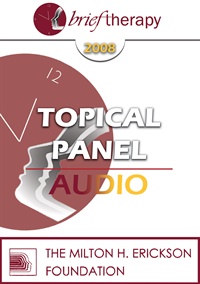
- Average Rating:
- Not yet rated
- Topic Areas:
- Topical Panels | Art and Creativity | Psychotherapy | Brief Therapy
- Categories:
- Brief Therapy Conference | Brief Therapy Conference 2008
- Faculty:
- Steve Andreas, MA, NLP | Scott Miller, PhD | Erving Polster, PhD | Ernest Rossi, PhD
- Duration:
- 58:47
- Format:
- Audio Only
- Original Program Date:
- Dec 13, 2008
- Short Description:
- BT08 Topical Panel 11 - Psychotherapy: Art or Science - Steve Andreas, MA, Scott Miller, PhD, Erving Polster, PhD, Ernest Rossi, PhD
- Price:
- $15.00 - Base Price
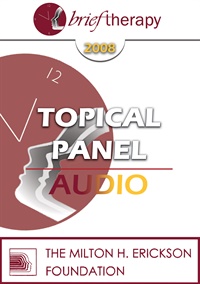
- Average Rating:
- Not yet rated
- Topic Areas:
- Topical Panels | Sex and Sexuality | Brief Therapy
- Categories:
- Brief Therapy Conference | Brief Therapy Conference 2008
- Faculty:
- Florence Kaslow, PhD, ABPP | Janis Abrahms Spring, PhD, ABPP | Michele Weiner-Davis, LCSW | Jeffrey Zeig, PhD
- Duration:
- 1:00:26
- Format:
- Audio Only
- Original Program Date:
- Dec 13, 2008
- Short Description:
- BT08 Topical Panel 12 - Sexual Issues - Florence Kaslow, PhD, ABPP, Janis A. Spring, PhD, Michele Weiner-Davis, MSW, Jeffrey Zeig, PhD
- Price:
- $15.00 - Base Price
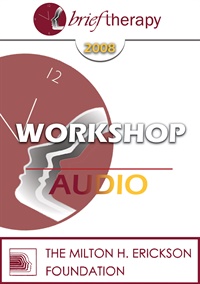
- Average Rating:
- Not yet rated
- Topic Areas:
- Workshops | Trauma | Brief Therapy | Children and Adolescent Therapy
- Categories:
- Brief Therapy Conference | Brief Therapy Conference 2008
- Faculty:
- Lenore Terr, MD
- Duration:
- 2:45:21
- Format:
- Audio Only
- Original Program Date:
- Dec 11, 2008
- Short Description:
- Whether brief or long-term, the treatment of childhood trauma should include an opportunity for the youngster to abreact (express strong emotion), correct (find individual, community or even fantasized solutions), and to discover contexts (perspectives and understandings of the events that occurred). Dr. Terr will thoroughly discuss and exemplify these three modes of treatment, selecting brief therapies as the clinical examples.
- Price:
- $15.00 - Base Price
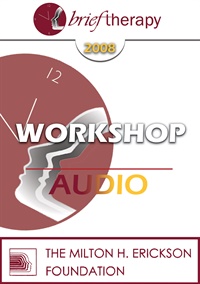
- Average Rating:
- Not yet rated
- Topic Areas:
- Workshops | Adlerian Therapy | Brief Therapy | Psychotherapy
- Categories:
- Brief Therapy Conference | Brief Therapy Conference 2008
- Faculty:
- Jon Carlson
- Duration:
- 44:18
- Format:
- Audio Only
- Original Program Date:
- Dec 11, 2008
- Short Description:
- Adlerian psychotherapy is an effective brief therapy model that integrates strategies from many other approaches. Adler's ideas highlight the importance of not only understanding the individual but the social context. This approach emphasizes working from a multi-cultural orientation and highlights personal responsibility. The approach uses a four-step process: Engagement, Assessment, Insight, and Reorientation. The focus of treatment is positive as the therapist uses encouragement strategies to help the client identify their assets and strengths. Videotape examples of actual sessions will be used to highlight the process and demonstrate how effective short-term change is possible with this approach.
- Price:
- $15.00 - Base Price
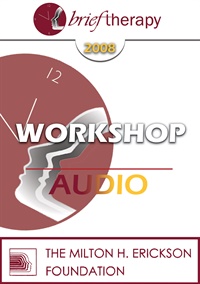
- Average Rating:
- Not yet rated
- Topic Areas:
- Workshops | Borderline | Brief Therapy | Personality Disorders | Solution Oriented Approach
- Categories:
- Brief Therapy Conference | Brief Therapy Conference 2008
- Faculty:
- Michael Munion, MA, LPC
- Duration:
- 2:28:27
- Format:
- Audio Only
- Original Program Date:
- Dec 11, 2008
- Short Description:
- This workshop examines the nature of Borderline Personality Disorder (BPD), and presents an integrated model of treatment of specific issues in brief, solution-focused episodes. Core elements of a safety plan and development of a community resource network are described. Careful management of the therapeutic relationship is a critical part of this approach. Some specific protocols for common BPD issues, such as suicidal ideation and self-injurious behaviors are elaborated.
- Price:
- $15.00 - Base Price
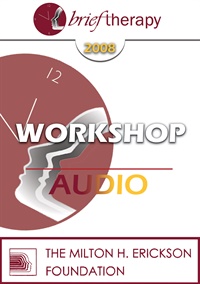
- Average Rating:
- Not yet rated
- Topic Areas:
- Workshops | Children and Adolescent Therapy | Brief Therapy | Meditation, Spirituality and Yoga | Mindfulness | Strengths-Based
- Categories:
- Brief Therapy Conference | Brief Therapy Conference 2008
- Faculty:
- Matthew Selekman, MSW
- Duration:
- 2:34:38
- Format:
- Audio Only
- Original Program Date:
- Dec 11, 2008
- Short Description:
- Adolescent self-harming behavior is on the rise and is one of the most challenging presenting problems school professionals, healthcare providers, and therapists will face in their clinical practice settings. In this "hands-on" practice-oriented workshop, participants will learn several distress management tools and strategies to strengthen the adolescent's self-soothing and coping capacities and family connection building rituals and therapeutic experiments to foster closer and stronger parent-adolescent relationships. Parent management skills for constructively responding to their adolescents' inevitable self-harming slips will be presented.
- Price:
- $15.00 - Base Price
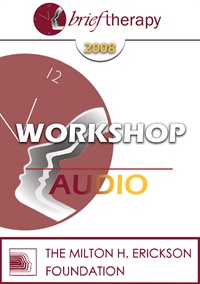
- Average Rating:
- Not yet rated
- Topic Areas:
- Workshops | Utilization | Brief Therapy | Self-Image Thinking | Resources
- Categories:
- Brief Therapy Conference | Brief Therapy Conference 2008
- Faculty:
- Stephen Lankton, MSW
- Duration:
- 2:19:24
- Format:
- Audio Only
- Original Program Date:
- Dec 11, 2008
- Short Description:
- Three specific techniques are universally valuable in brief therapy: utilization, experience resource retrieval, experiential-based imagery rehearsal. This workshop provides an exposure to these concepts and techniques with clear examples and demonstrations. Participants should find numerous ways to enhance their brief therapy practice in any setting and with all populations of clients.To list the essential aspects of the utilization approach for reducing resistance across multiple settings.
- Price:
- $15.00 - Base Price
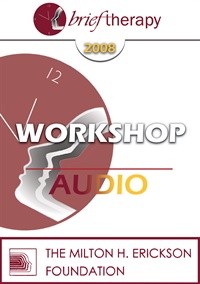
- Average Rating:
- Not yet rated
- Topic Areas:
- Workshops | Relationships | Brief Therapy | Therapist Development
- Categories:
- Brief Therapy Conference | Brief Therapy Conference 2008
- Faculty:
- Steve Andreas, MA, NLP
- Duration:
- 2:32:52
- Format:
- Audio Only
- Original Program Date:
- Dec 11, 2008
- Short Description:
- Difficult relationships are often confusing. This disorder, rather than the content differences, often keeps us from finding resolution. Learn a simple, yet detailed, content-free process to sort out this unconscious confusion, reach clarity, understand other's experience, and spontaneously change perceptions and responses to become more resourceful. A demonstration will be given.
- Price:
- $15.00 - Base Price
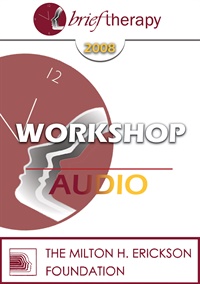
- Average Rating:
- Not yet rated
- Topic Areas:
- Workshops | Art and Creativity | Brief Therapy | Therapist Development
- Categories:
- Brief Therapy Conference | Brief Therapy Conference 2008
- Faculty:
- Jeffrey Kottler, PhD
- Duration:
- 2:02:24
- Format:
- Audio Only
- Original Program Date:
- Dec 11, 2008
- Short Description:
- The experience of being a therapist can often seem routine, dealing with similar issues, telling well-worn stories, and applying favored methods. Yet occasionally there are moments, even whole sessions, that appear miraculous in their innovation. This workshop explores the process and mechanisms of creative breakthroughs, based on interviews with the world's most innovative clinicians.
- Price:
- $15.00 - Base Price
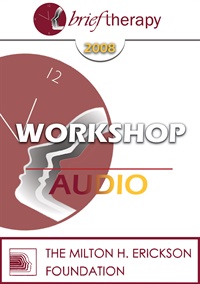
- Average Rating:
- Not yet rated
- Topic Areas:
- Workshops | Brief Therapy | Therapist Development
- Categories:
- Brief Therapy Conference | Brief Therapy Conference 2008
- Faculty:
- Erving Polster, PhD
- Duration:
- 2:46:16
- Format:
- Audio Only
- Original Program Date:
- Dec 11, 2008
- Short Description:
- Personal identity is a crucial guide to the way people live their lives. Dr. Polster will examine how therapy may accentuate and empower familiar identities and how to resuscitate those which are dimmed. Conceptual elaboration will be joined with live therapy sessions, showing how concepts connect with therapeutic work.
- Price:
- $15.00 - Base Price
Please wait ...

